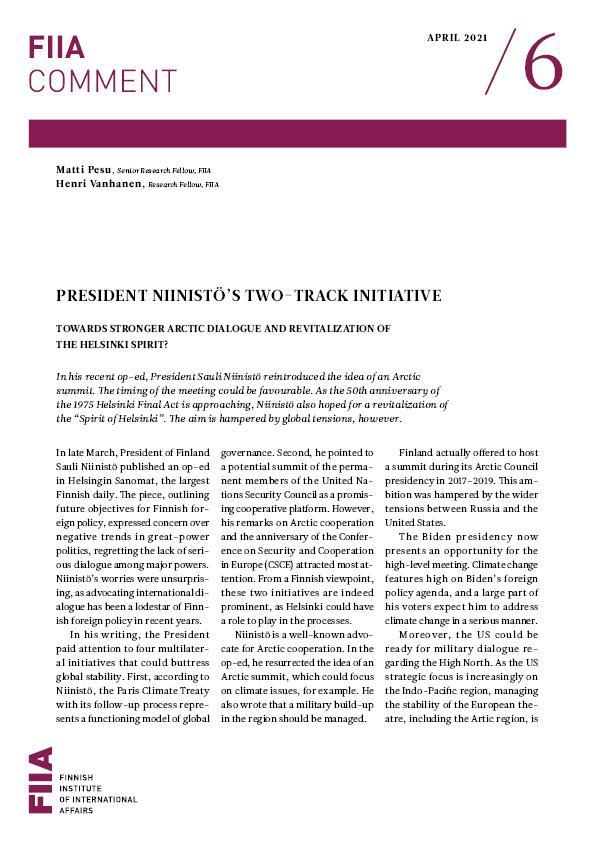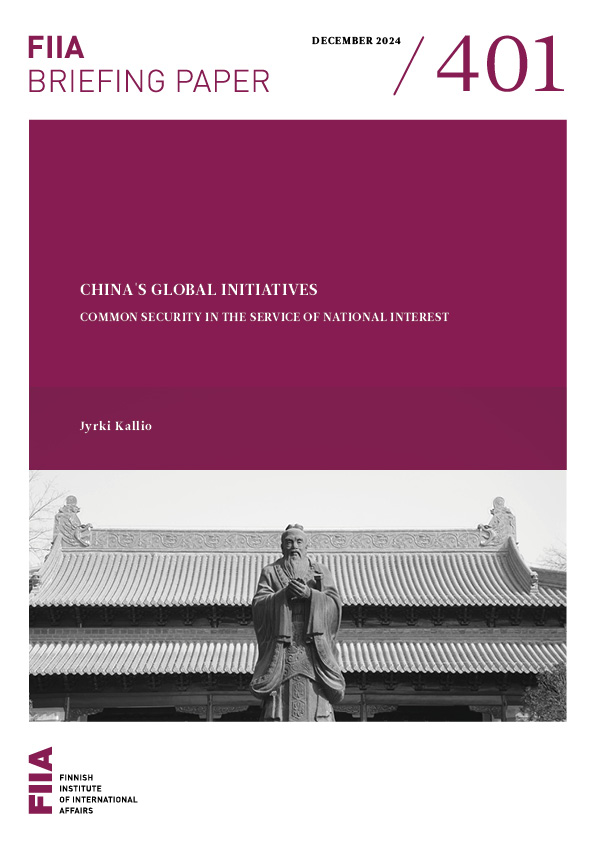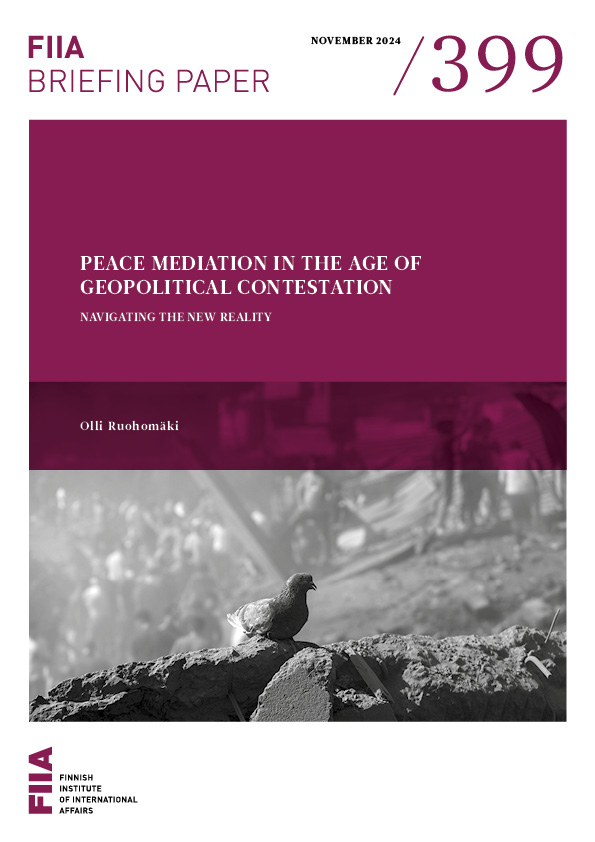In his recent op-ed, President Sauli Niinistö reintroduced the idea of an Arctic summit. The timing of the meeting could be favourable. As the 50th anniversary of the 1975 Helsinki Final Act is approaching, Niinistö also hoped for a revitalization of the “Spirit of Helsinki”. The aim is hampered by global tensions, however.
In late March, President of Finland Sauli Niinistö published an op-ed in Helsingin Sanomat, the largest Finnish daily. The piece, outlining future objectives for Finnish foreign policy, expressed concern over negative trends in great-power politics, regretting the lack of serious dialogue among major powers. Niinistö’s worries were unsurprising, as advocating international dialogue has been a lodestar of Finnish foreign policy in recent years.
In his writing, the President paid attention to four multilateral initiatives that could buttress global stability. First, according to Niinistö, the Paris Climate Treaty with its follow-up process represents a functioning model of global governance. Second, he pointed to a potential summit of the permanent members of the United Nations Security Council as a promising cooperative platform. However, his remarks on Arctic cooperation and the anniversary of the Conference on Security and Cooperation in Europe (CSCE) attracted most attention. From a Finnish viewpoint, these two initiatives are indeed prominent, as Helsinki could have a role to play in the processes.
Niinistö is a well-known advocate for Arctic cooperation. In the op-ed, he resurrected the idea of an Arctic summit, which could focus on climate issues, for example. He also wrote that a military build-up in the region should be managed.
Finland actually offered to host a summit during its Arctic Council presidency in 2017–2019. This ambition was hampered by the wider tensions between Russia and the United States.
The Biden presidency now presents an opportunity for the high-level meeting. Climate change features high on Biden’s foreign policy agenda, and a large part of his voters expect him to address climate change in a serious manner.
Moreover, the US could be ready for military dialogue regarding the High North. As the US strategic focus is increasingly on the Indo-Pacific region, managing the stability of the European theatre, including the Artic region, is becoming increasingly important to Washington. A stable Europe is a critical precondition for devoting more resources to tackling the security challenges in Asia.
Russia, too, could have an interest in serious Arctic dialogue. The region is economically vital for Russia, and the realization of its full economic potential necessitates a stable environment. Furthermore, as China’s Arctic ambitions are on the rise, both Moscow and Washington, as well as other Arctic nations, may want to demonstrate to Beijing who the actual Arctic players are – despite China’s central role in Arctic climate matters. The summit would serve such a purpose well.
Russia will take over the Arctic Council presidency in May 2021. Even if the potential meeting does not take place in the Council’s framework, Moscow may offer to host the summit. If Russia’s initiative is not echoed among its fellow Arctic nations, a window of opportunity might open for Finland. That said, the future of the meeting is not in Finland’s hands.
In addition to Arctic cooperation, the President brought up the approaching 50th anniversary of the CSCE. More specifically, Niinistö expressed his concern over the erosion of the “Spirit of Helsinki”. Indeed, the Helsinki summit not only consolidated détente but also eventually strengthened democracy and human rights in Europe. Today, global tensions and instability are growing, and democratic backsliding is witnessed across the globe.
The anniversary presents an opportunity to remind the international community of the legacy of the Helsinki Spirit. More importantly, the Organization for Security and Cooperation in Europe (OSCE), which is built on the foundation of the Helsinki Final Act, expects Finland – a key architect of the CSCE/OSCE system – to play a major role in the commemoration of the 1975 summit.
The details of the exercise are currently unclear. OSCE summits have been held infrequently. The most recent meeting convened in Astana in 2010. Subsequently, tensions in European security have increased. Russia has violated OSCE principles by illegally annexing Crimea and by starting a war in eastern Ukraine. An OSCE summit without meaningful progress with regard to the conflict – which remains the most burning problem in European security – seems unlikely. Currently, there is little positive development in sight. On the contrary, Russia’s ongoing military buildup near Ukraine’s eastern border and in Crimea casts additional dark clouds over European security.
An OSCE summit would require a genuine political process serving the interests of all stakeholders. Such a task will be fraught with challenges, and preparations should be initiated immediately.
However, the revitalization of the Spirit of Helsinki does not have to take place in the OSCE format. Due to factions within the organization, arranging a gathering outside of the OSCE framework could be a more realistic alternative. That said, amid international tensions, it will be a considerable challenge to come up with an agenda uniting the countries from “Vancouver to Vladivostok”.
1975 marked an undeniable milestone in Finnish foreign policy, and its legacy should be duly preserved. The level of ambition should be high despite the demanding international milieu. The fates of the Arctic summit and commemoration of the Spirit of Helsinki hinge on the forthcoming developments in international politics. If tensions remain manageable, Finland’s activity may lead to tangible results.









